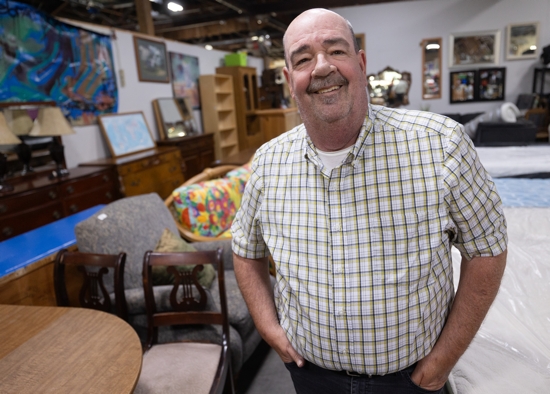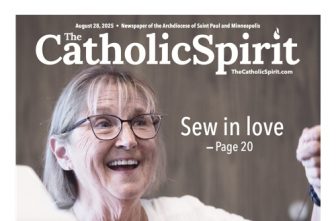
At 65, Ed Koerner is entering a new season: newly retired, freshly energized and just back from a two-week trip to Italy gifted by his son. “I feel like I’m just beginning,” said the lifelong Catholic, who attends St. Edward, a half-mile from his Bloomington home. He spent nearly 25 years as executive director of the Society of St. Vincent de Paul (SVDP) in the Archdiocese of St. Paul and Minneapolis — one of many ways he’s lived out his deep conviction that “it’s our privilege to serve the poor, not our right.”
Q) What drew you to the Society of St. Vincent de Paul?
A) It was familiar. My dad was a member growing up in Chicago. I have vivid memories of packing up the wagon and taking food and other items downtown to donate. When I saw SVDP on my parish’s list of ministries, it was easy to check the box. Once I got involved, it just fit. I’m a giver.
Q) What is it about St. Vincent that still speaks to you?
A) What he taught is still relevant 500 years later. He said it’s our privilege to serve the poor, and he meant it. The poor don’t want your cast-off stuff — they want your love. That’s not always an easy gift to give, but once you do and begin to see the transformation in people, it’s life-changing. He also said the poor don’t lack for resources. There are plenty of resources. What they lack is organization — gathering them and delivering them in the most loving way.
Q) How did your Catholic faith shape your work?
A) It’s everything. We’re actually a prayer group. Every SVDP meeting starts with prayer and Gospel reflection. That’s how we take our marching orders. Over time, I became more aware of what the Gospel is really saying, especially about serving the poor, because of the formation I received in the Society.
Q) You led the Society through some major upheaval. What stands out to you about the pandemic years?
A) In 2020, right before COVID shutdowns began, I was working with the Minneapolis Police Department on a food giveaway. We brought two-and-a-half truckloads of food to their special operations center. Officers in training, community engagement officers — we were all packing food together. I remember one officer asking a man, “Can I get you some beef or chicken with your bag of dried goods?” That’s how it should be: human to human. No badge, just people. It was beautiful.
Then everything shut down. But by the grace of God, we had already built infrastructure. At the height of COVID and the George Floyd aftermath, we were feeding 7,000 to 10,000 people a week. I never imagined that was possible. We just put it in God’s hands and trusted he would provide.
Q) Have you always had that kind of trust?
A) No. In 2015, I started inviting 30 other nonprofits over to feed them and was losing sleep wondering where the food would come from. A friend in Green Bay told me, “Jesus will never send you more people to feed than food he will provide.” Once I looked at it that way, everything changed.
Q) What’s the biggest misconception about poverty?
A) That poor people are lazy. If you’ve ever been poor, you know surviving is hard work. People are often working two or three jobs just to keep their head at water level. Another one I hear is: “What’s wrong with that person?” There’s nothing wrong with them. They’re just like you and me. Made in the image of God. Everyone has a talent. Even if it’s baking great chocolate chip cookies, that’s a talent.
Q) How do you get people to see that?
A) Storytelling. Stories are simple and relatable. I didn’t understand divine providence until I started seeing it in action.
One story I love to tell: Down in Faribault, we turned an old school into a service center. One night, the volunteer director was locking up when a young couple pulled in. The woman was visibly pregnant. They needed food. Of course, we helped. As he was loading the car, the man asked, “You don’t happen to have any fans, do you? It’s unbearably hot in our apartment.” At that exact moment, a pickup pulled into the lot with three air conditioners in the back. The man not only donated them, he followed the couple home and installed one. That wasn’t a coincidence. That was God. We see that kind of thing all the time.
Q) It must be great to witness that generosity again and again.
A) It has restored my faith in humanity. I know those helpers are out there, you just have to tell them your story. You just need to find them.
Q) What are you proudest of?
A) Growing the Society in the archdiocese. Starting new groups — Rochester, Brainerd, Elk River, Crystal. The more people we get involved, the more people we can help. I loved mentoring new leaders and finding ways to support people behind the scenes. I’m excited about my successor, Wayne Bugg, (who) we promoted from within. He already has 25 years with St. Vincent’s, and I’m sure he’ll be a better leader than (me).
Q) How do you see the Holy Spirit at work now that you’re retired?
A) I’m trying to listen. I once received advice to “listen to the whisperings of the Holy Spirit.” That’s what I’m trying to do now. He knows my makeup better than anyone. I just have to stay open.
Q) Do you feel 65?
A) Some days I feel older, like after a long day of yardwork. But then other days I don’t. Just yesterday, I had a meeting and then spent three hours in the pool with my 4-year-old granddaughter. I’ve swum more this year than the past 20 years combined. Every minute in the pool with my grandkids is time I cherish.
Q) Now that you’re retired, you get to ease into your morning.
A) It feels different. I’m starting to like it. It’s way more relaxing. It almost feels like a vacation. It doesn’t really feel like the future yet. I know I’m not going to be able to sit still. I was always up between 4:30 and 5 a.m. — my day would start a couple hours before I left home, sitting at my computer, figuring out what I had to do. Now I still wake up early, but I don’t jump out of bed. I lay there and doze back off for a few minutes. I’m out of bed by 6:30 or 6:45, which is fine.
Q) What makes you feel like you’re just beginning?
A) Thirty years ago, if you’d asked me if I’d make it to 65, I’d have said no way. I had substance abuse issues. But I got sober. I got my wife back — we divorced, then remarried after five years apart. It was life-changing. I feel so grateful for that second chance. Now I’m excited. I’m going to be working on the mayoral campaign of one of my son’s high school friends. I’ll knock on doors, do whatever he needs.
Q) Has it helped seeing your wife navigate retirement?
A) Yes. Since she retired three years ago, she’s found new purpose. She started substitute teaching in Bloomington and loved it — especially with kids who have special needs. Then she joined the Red Cross and even got deployed to Kentucky before Easter to help during a flood. Watching her rediscover what she loves helped me see that retirement isn’t the end of anything. It’s just a new chapter.
Q) What have you learned about aging?
A) I want to approach it with open eyes and an open mind. I want to stay connected and pay attention to what the Holy Spirit is telling me about the next phase of my life.
Q) What do you know for sure?
A) It’s a lot easier to be kind and love than to be nasty and mean. It doesn’t take much effort — just a little thought before you act. One of the simple truths I brought to the Society was to treat people how you want to be treated. That sounds easy, but it’s not always. You’ve got to slow down and really see the person in front of you. Everyone deserves dignity and respect.



